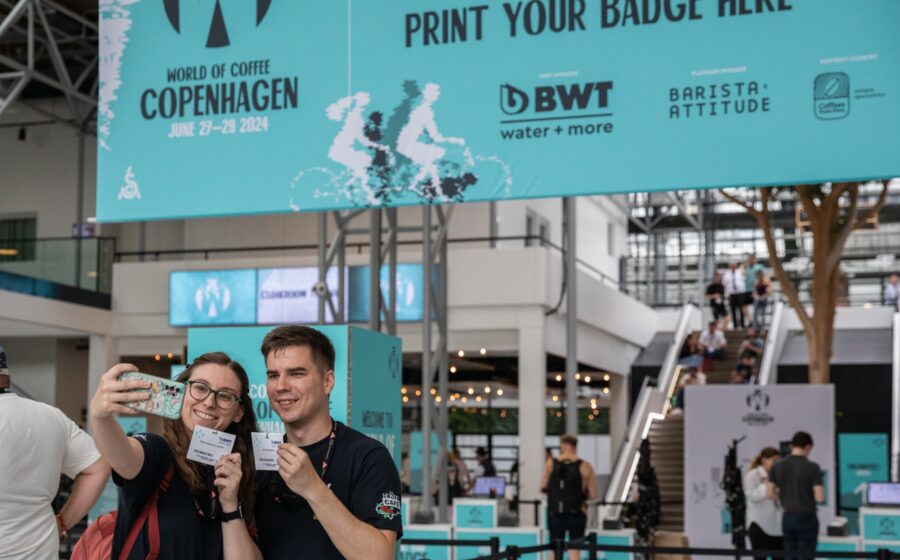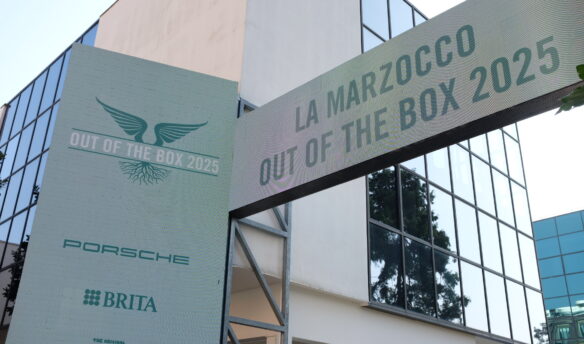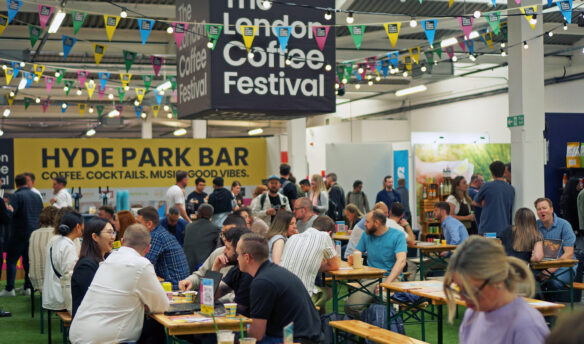Copenhagen played host to the 2024 World of Coffee, a global trade show that featured exhibitors from around the world, showcased excellence in design, and crowned four new global coffee champions in events like the World Latte Art and World Coffee in Good Spirits competitions.
World of Coffee took place June 27 through 29 at the Bella Center, hot on the heels of the 2024 Specialty Coffee Expo in Chicago in April. In its aftermath, many have called World of Coffee the largest and most expansive Specialty Coffee Association event so far.
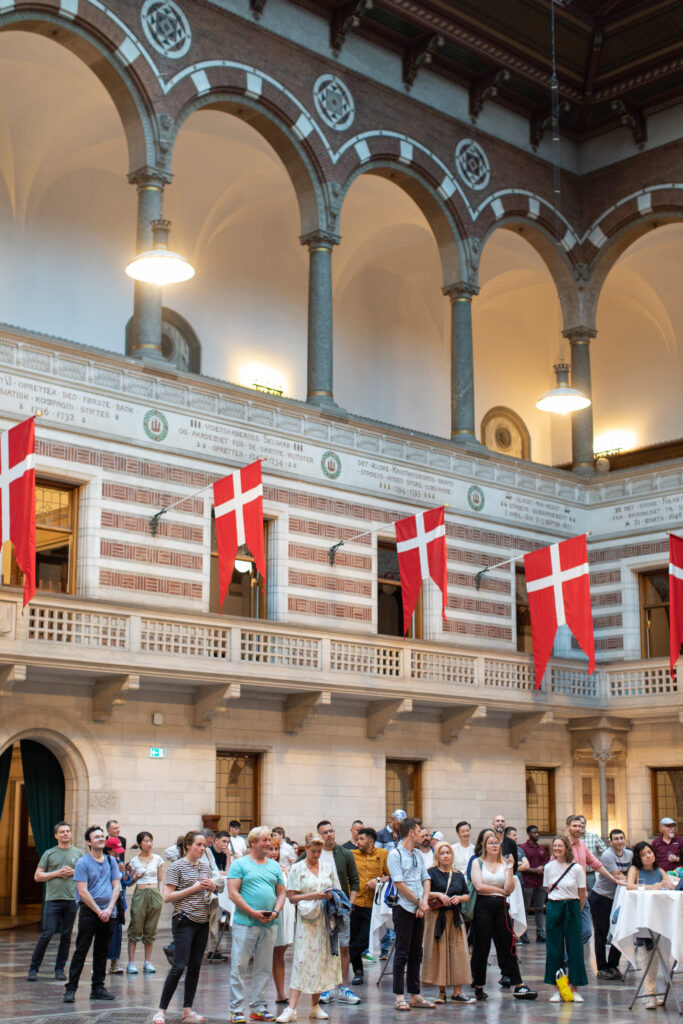
For us, Copenhagen’s 350+ exhibitors and dozens of informative lectures made for an exciting World of Coffee experience. Here are a few things we noticed in our caffeine-fueled haze.
An appetite for more than just coffee
World of Coffee Copenhagen kicked off on an unusually hot Thursday for June, with a high of around 27° C (80.6° F), a temperature at which Danish authorities typically issue a heat advisory. This meant that after a morning of brewed coffee, the BUNN booth, which had a slushie machine dispensing strawberry and pineapple-flavored drinks and whose bright red and yellow contents shimmered like a mirage, was a big standout.
Another highlight was the free tap water dispensers placed at regular intervals around the Bella Center, which encouraged visitors to “Do as the Danes” and drink tap water to keep cool.
It’s no secret that extreme weather patterns, one consequence of climate change, threaten the future of coffee.
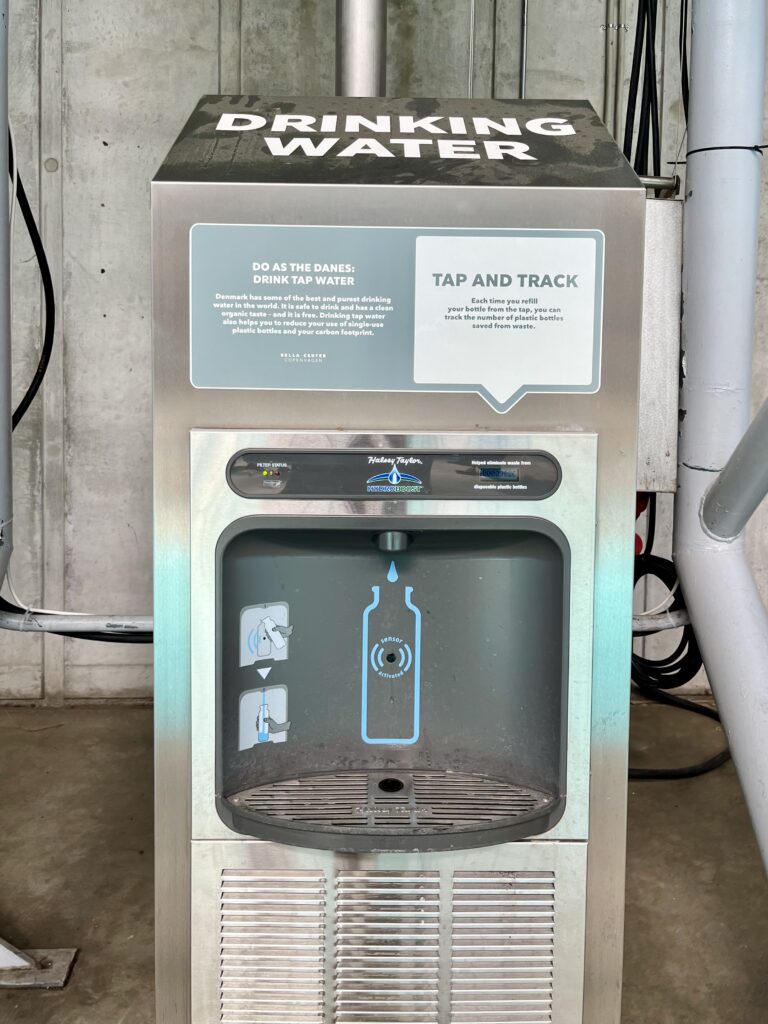
Because water also plays a huge role in the growing, processing, and consumption of coffee, the tap water dispensers encouraged attendees to reflect on water as a limited resource—one to which many people still lack safe and equitable access—and which also made our collective reason for gathering at World of Coffee possible: the water purification company BWT served as the event’s host sponsor.
Improved producer representation
While coffee trade shows tend to highlight value creation in countries traditionally associated with coffee consumption rather than coffee-producing nations, that is thankfully beginning to change.
“I enjoyed the presence of producers from Africa, Asia, and Latin America, represented by national stakeholders and private companies,” said Dagmawi I.E., director of programs for Grounds for Health and CEO of Eshi Safaris LLC. “It was interesting to see multiple booths by Kenyan stakeholders and the EthioLatin Community of Practice from Colombia, Ethiopia, and Honduras.”
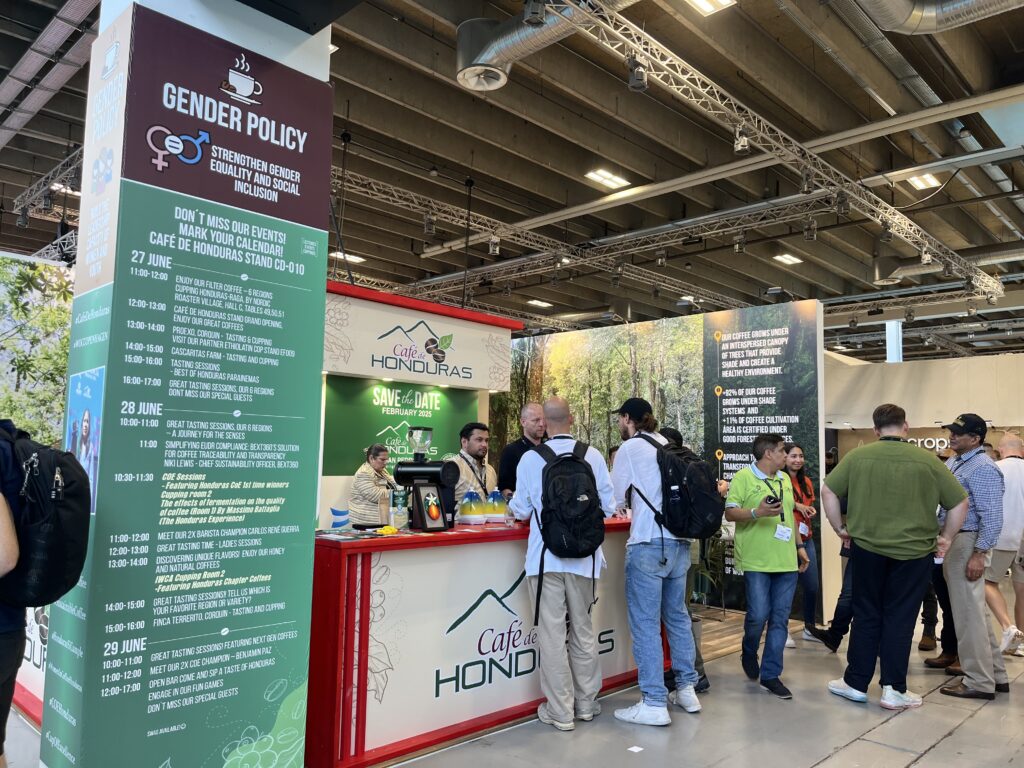
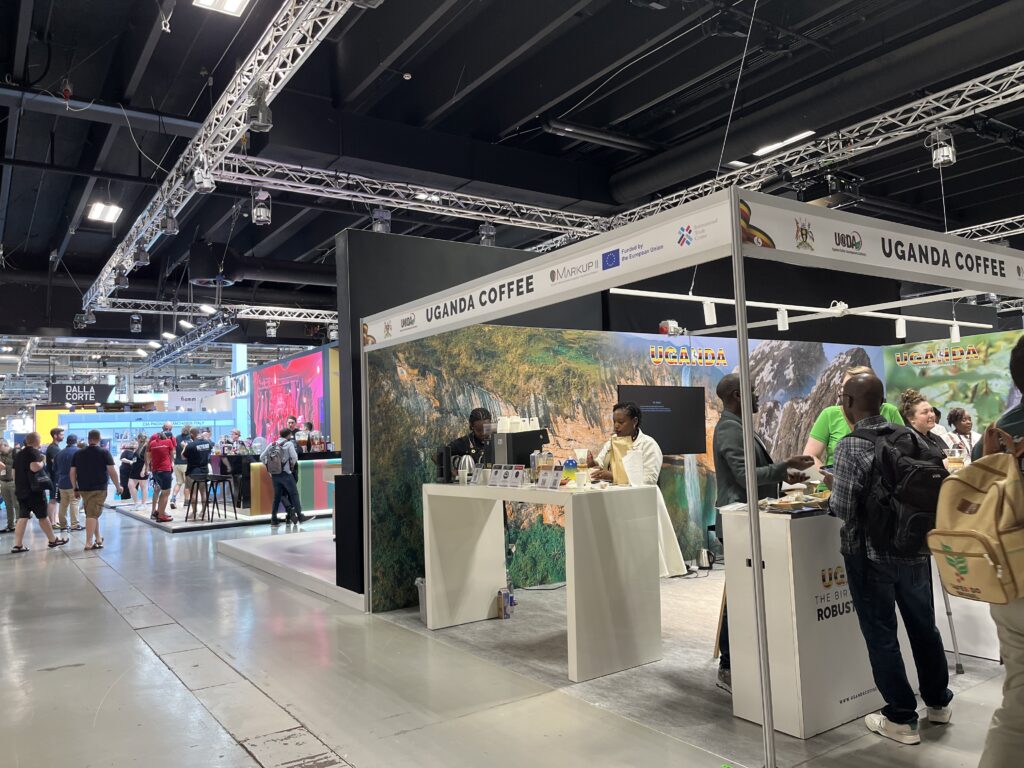
At the event, booths helmed by coffee producers and country representatives took up a full wing of the main hall. Within steps of entering the hall, we bumped into representatives from Papua New Guinea who were fresh off a red-eye flight and surprised at the sunny weather—they were prepared for projected rainstorms with raincoats (the rain came fashionably late on day 2).
Meanwhile, at the Guatemala booth, Huehuetenango coffee farmer Jaime Alfredo Quiñónez Camposeco stood proudly next to an urn featuring his coffee, ready to offer passing patrons a cup and negotiate a sale of green coffee.
A strong focus on upcoming anti-deforestation legislation
The European Union Regulation on Deforestation-free Products (EUDR), which comes into full force at the end of 2024, was a central discussion point at the event. The EUDR requires EU companies importing commodities like coffee to prove they were not grown on deforested land. The legislation is expected to complicate trade with the estimated 25 million coffee smallholders producing 80% of the world’s coffee due to the technical and financial challenges of geo-mapping and traceability.
While this may impact coffee supply in the EU market in the long term, some attendees weren’t worried. “I was expecting more anxiety in the European coffee industry than I found,” Peter Giuliano, executive director at Coffee Science Foundation, wrote in a LinkedIn post about World of Coffee. “Even though we’re in uncertain economic and political times, and the challenge of EUDR is on the horizon, I found most coffee business leaders to be excited, optimistic, and preparing for growth.”
“Regulations are a step in the right direction,” says John Francois, founder of Asili Coffee, Akuapem Coffee Growers Association, and The Akuapem Coffee Incubator in Ghana. “My incubator is part of the ACP Business Friendly Program promoted by the International Trade Center Alliances for Action, which has placed great emphasis on building awareness towards the EUDR. [Meanwhile] we are working hard to promote agroforestry. […] The EUDR creates a top-down pressure with a framework that makes sustainable practices a requirement for achieving the profitability that we love so!”
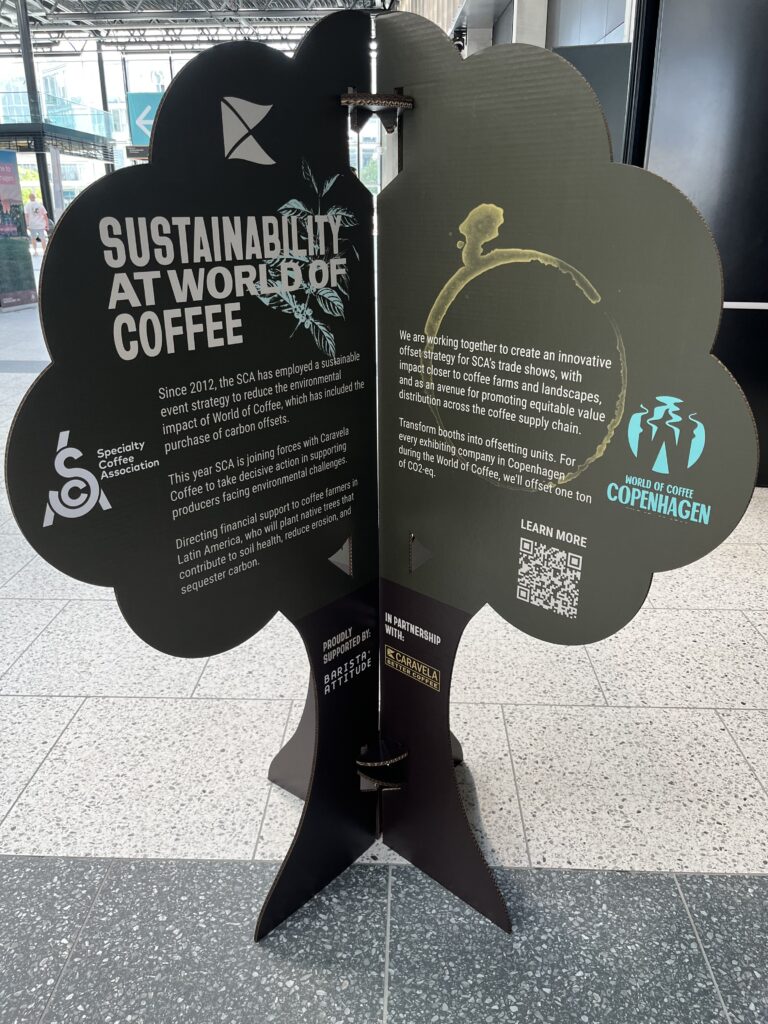
World of Coffee Copenhagen also featured other sustainability-related touchpoints. In his post, Giuliano wrote, “I was thrilled to see a diversity of technologies, sizes, and form factors of roasting machines, most promising improved energy efficiency.”
Tree-shaped cardboard signs were scattered across the show floor, highlighting the ways the SCA plans to host more sustainable events. For example, the organization plans to use carbon offsets and provide financial support to Latin American coffee farmers. The event’s location also wasn’t lost on us: Copenhagen is considered one of the world’s “greenest” cities, with sustainability-focused infrastructure and urban planning initiatives. Many attendees took public transportation directly to the Bella Center.
The rollout of the SCA’s new Coffee Value Assessment
Visitors seeking refuge from the hustle and bustle of the main hall could rest in the SCA’s community space, which was set up with educational posters about the Coffee Value Assessment. The SCA aims to redefine its previous evaluation system, which was released in 2004 and until now, didn’t reflect modern shifts in how the quality and characteristics of coffee are perceived and valued.
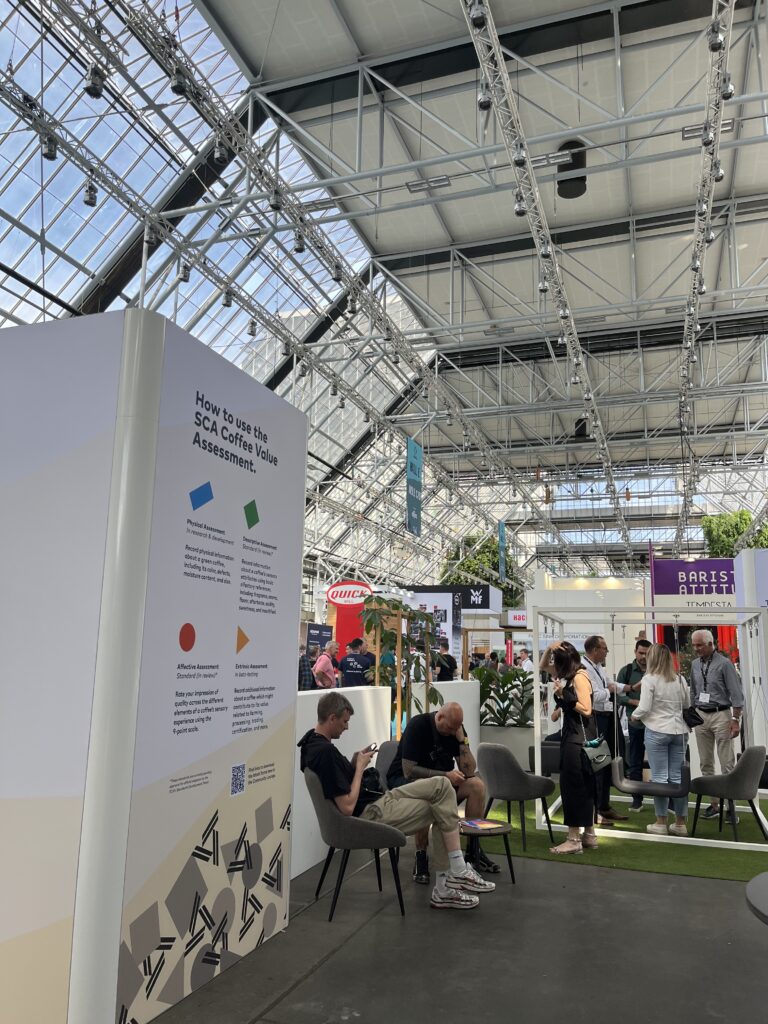
Officially adopted in 2024, the CVA is the result of the SCA’s collaboration with industry stakeholders, coffee researchers, and scientists to update the cupping and coffee evaluation system into a “new holistic value discovery tool [that] offers a complete, transparent, ‘high resolution’ picture of a coffee, recognizing all the things we might love (and value) about a coffee,” one poster explained.
Initial reactions from the coffee community appeared positive. “This is the best attempt I’ve seen to make coffee quality more equitable, something that’s growing in importance as we see varieties and species coming in and out of vogue,” says Miranda Caldwell, founder of The Coffee MBA. “There needs to be action behind the ideas we all have around what an equitable future looks like. I think this is a great attempt by the SCA to initiate a global shift.”
The Danish spirit of collaboration is alive and well
There was no shortage of coffee at the event. Almost anywhere we turned, we saw companies—from an Italian espresso machine manufacturer to a Danish ceramics brand—showing the utility of their equipment and accessories by brewing coffee from a rotating list of Danish and international roasters. To us, this felt very much in line with the spirit of collaboration that has defined the evolution of specialty coffee in Denmark.
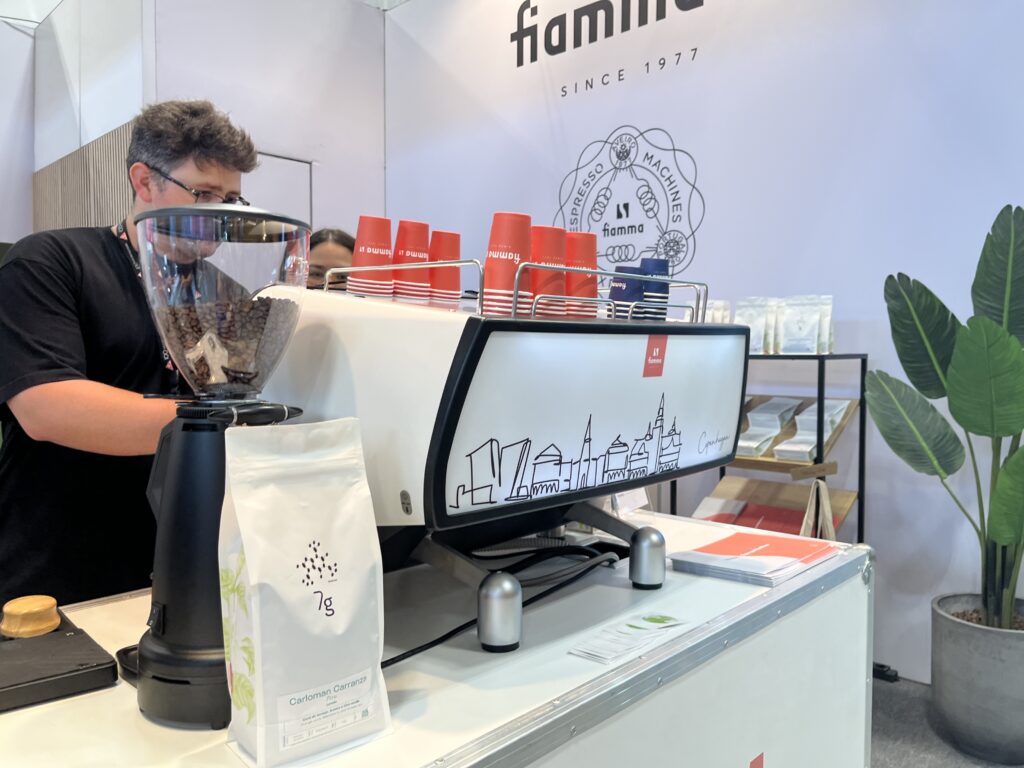
In particular, we were drawn to a Fiamma espresso machine with a line drawing of the Copenhagen skyline. Representatives from Portuguese coffee roaster 7g stood ready to offer people a washed Bourbon from Peru with notes of orange curd, blackberry, and green tea.
“I am always so happy to see how friendly and passion-driven the coffee industry is. It feels like everyone is colleagues more than competitors,” said Andreas Astrup, CEO and founder of Copenhagen-based ROAST Coffee. Astrup says his most interesting takeaway from World of Coffee was the development of new coffee roasting machines, especially Norwegian brand ROEST’s P3000 roaster.
Elsewhere, Standart Magazine collaborated with Probat to host a competitive, coffee-themed card game. “As a magazine with a fully remote team, we rarely have the chance to gather […] all at once,” says Standart founder Michal Molcan. “The World of Coffee events offer a rare opportunity for the coffee community to come together, brewing up new ideas and friendships. Ah, and Copenhagen was the perfect city for these chance encounters to take place!”
To that, we say, “Jeg er helt enig.” (I totally agree, in Danish.)
Cover photo courtesy of the Specialty Coffee Association.
